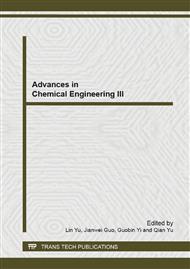p.969
p.975
p.979
p.983
p.988
p.993
p.999
p.1003
p.1007
Green Ester Lubricants Based on Rapeseed Acid and their Lubricity
Abstract:
Several complex esters were synthesized from phthalic anhydride, neopentyl glycol and rapeseed acid. Their rheological properties, biodegradability and tribological properties were measured. It was found that the complex esters have a wide viscosity range of 126~325mm2/s at 40°C with viscosity indices about 127~143, and solidifying points lower than-38°C. The maximum non seizure load of a complex ester with degree of polymerization 1.42 is as high as 735 N, with a wear scar diameter of 0.41mm, superior to mineral oil. The biodegradation rates are higher than 73%, and the thermal stability is good. So these complex esters are a class of green synthetic ester oils with excellent properties.
Info:
Periodical:
Pages:
988-992
Citation:
Online since:
September 2013
Authors:
Keywords:
Price:
Сopyright:
© 2013 Trans Tech Publications Ltd. All Rights Reserved
Share:
Citation:


